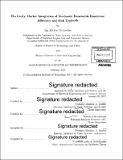| dc.contributor.advisor | Mardavij Roozbehani and Munther A. Dahleh. | en_US |
| dc.contributor.author | Schneider, Ian Michael | en_US |
| dc.contributor.other | Massachusetts Institute of Technology. Department of Electrical Engineering and Computer Science. | en_US |
| dc.coverage.spatial | n-us--- | en_US |
| dc.date.accessioned | 2017-05-11T19:57:51Z | |
| dc.date.available | 2017-05-11T19:57:51Z | |
| dc.date.copyright | 2017 | en_US |
| dc.date.issued | 2017 | en_US |
| dc.identifier.uri | http://hdl.handle.net/1721.1/108958 | |
| dc.description | Thesis: S.M. in Technology and Policy, Massachusetts Institute of Technology, School of Engineering, Institute for Data, Systems, and Society, Technology and Policy Program, 2017. | en_US |
| dc.description | Thesis: S.M. in Electrical Engineering, Massachusetts Institute of Technology, Department of Electrical Engineering and Computer Science, 2017. | en_US |
| dc.description | Cataloged from PDF version of thesis. | en_US |
| dc.description | Includes bibliographical references (pages 55-57). | en_US |
| dc.description.abstract | Electricity generation from renewable sources is growing rapidly, but the variability and uncertainty of renewable resources like wind and solar energy can increase the costs of supplying reliable electricity. Competitive markets for wholesale electricity are widely used in the United States, but the regulatory details that govern their treatment of stochastic resources can have significant effects on efficiency and risk. This research analyzes how producers respond to market mechanisms intended to improve forecasting and long-term siting decisions. This thesis characterizes producer equilibrium strategies in competitive short term energy markets by examining the bidding behavior of energy market participants when energy imbalance payments are determined endogenously from market clearing conditions. The results show that the market-based pricing mechanism leads to better tradeoffs of system efficiency and risk compared to the case where penalties are exogenous, suggesting additional benefits of market-based penalty prices beyond those previously studied. This research also explores how long-term market investment equilibria are affected by current energy policies. It presents new analytical results showing how the Production Tax Credit (PTC) biases wind investment towards high-producing sites, but with higher overall levels of wind correlation, which can induce additional costs associated with reliability and system risk. | en_US |
| dc.description.statementofresponsibility | by Ian Michael Schneider. | en_US |
| dc.format.extent | 57 pages | en_US |
| dc.language.iso | eng | en_US |
| dc.publisher | Massachusetts Institute of Technology | en_US |
| dc.rights | MIT theses are protected by copyright. They may be viewed, downloaded, or printed from this source but further reproduction or distribution in any format is prohibited without written permission. | en_US |
| dc.rights.uri | http://dspace.mit.edu/handle/1721.1/7582 | en_US |
| dc.subject | Institute for Data, Systems, and Society. | en_US |
| dc.subject | Technology and Policy Program. | en_US |
| dc.subject | Electrical Engineering and Computer Science. | en_US |
| dc.title | Electricity market integration of stochastic renewable resources : efficiency and risk tradeoffs | en_US |
| dc.type | Thesis | en_US |
| dc.description.degree | S.M. in Technology and Policy | en_US |
| dc.description.degree | S.M. in Electrical Engineering | en_US |
| dc.contributor.department | Massachusetts Institute of Technology. Department of Electrical Engineering and Computer Science | |
| dc.contributor.department | Massachusetts Institute of Technology. Engineering Systems Division | |
| dc.contributor.department | Massachusetts Institute of Technology. Institute for Data, Systems, and Society | |
| dc.contributor.department | Technology and Policy Program | |
| dc.identifier.oclc | 986484783 | en_US |
